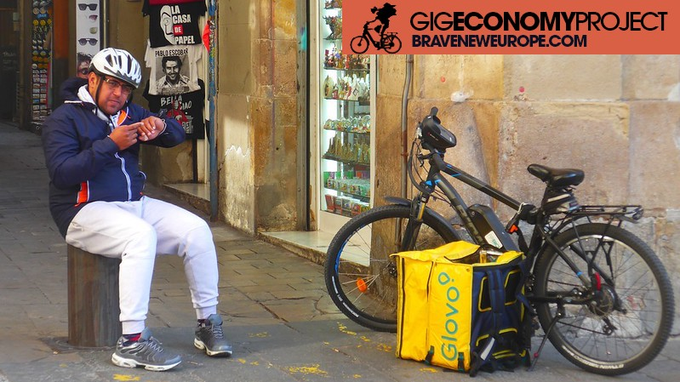With the Riders Act set to come into force on 12 August in Spain, gig platforms Deliveroo and Glovo are refusing to accept the law of the land: that they have to employ their riders.
The Gig Economy Project, led by Ben Wray, was initiated by BRAVE NEW EUROPE enabling us to provide analysis, updates, ideas, and reports from all across Europe on the Gig Economy.
This series of articles concerning the Gig Economy in the EU is made possible thanks to the generous support of the Andrew Wainwright Reform Trust


While us citizens have to accept the laws of the land whether we like them or not, for corporations it doesn’t quite work that way. A law passed by democratically-elected representatives which impinges on their interests is merely seen as a power-play, in which the corporations have various tools with which they can respond in kind. When threatened, corporate power can be wielded against political power, and they have numerous possible tactics to deploy in this battle.
This is the basic framework of thought for some of the largest app-based food delivery company’s in Europe in response to the Spanish Government’s ‘Riders Act’, finally set to be enforced on 12 August. The ‘Stop Fake Autonomous Law’ essentially enshrines in law what nearly 50 Spanish courts have already adjudicated: that riders for companies like Glovo and Deliveroo are employees, not self-employed. The Law also gives worker representatives the right to access company algorithm’s as it relates to the workers, the first government to introduce such a right of corporate data access for workers.
All of this is unacceptable to the likes of Glovo and Deliveroo, and they waged a huge campaign, including mobilising an astroturf movement of riders, to try to block the Riders Act. They partially succeeded in their efforts, since the Riders Act has been significantly watered down from its original incarnation. Perhaps most problematically, the Law does nothing to prevent food delivery platforms sub-contracting riders from an employment agency, a move which will reduce transparency for workers and act as a downward pressure on pay.
Nonetheless, the Act remains sufficiently unacceptable to Glovo and Deliveroo that accepting it appears not to be an option. Deliveroo, the UK-based food delivery platform, has announced that it plans to pull its operations out of Spain entirely. The company concluded that the Riders Act meant to maintain a strong position in the Spanish market would now require a “very high level of investment” with “very uncertain” potential for growth and profits. In other words, the increased labour costs which will come from hiring employees – paying them the minimum wage, social security payments, sick leave, holidays, a pension – breaks the company’s business model. Deliveroo has never turned a profit in Spain with a false self-employed model, so what’s the chances with employed workers?
For Glovo, the equation is somewhat different. While Spain is a small part of Deliveroo’s overall operations, Glovo is headquartered in Spain and has a 43% market share, the highest of any of the food delivery company’s operating in Spain. Capital flight is not an option in their case, but the company has a very similar business model – heavily reliant on false-self employment – to Deliveroo and therefore will experience the same financial pressures resulting from the Riders Act.
Glovo’s answer is to yet again reject the judicial and political authority of the Spanish state, devising a new mixed-worker model where 2,000 riders will be hired directly as employees while the majority will continue to operate as self-employed, a move that appears to fly in the face of the law. Glovo’s army of lawyers think they have devised a way in which this still complies with the regulations.
“This new model will have new features and will allow simultaneous use of other applications and activities with total flexibility, autonomy and independence,” the company stated.
Sources have told El Diario that those new features include “the elimination of time slots and the participation of couriers in the pricing of orders”. The Spanish Government’s minister of Labour, Yolanda Díaz, has not immediately responded to Glovo’s proposal, and with just two weeks before the Riders Act comes into force, we will soon see whether the Labour Inspectorate treats Glovo’s new model as an illegal business operation or whether it will let it slide, which will undermine the Act and almost certainly lead to a new round of court actions pursued by trade unions.
RidersXDerechos, which has been at the forefront of the court actions against Glovo and other delivery platforms, responded to Glovo’s new model by stating that a “very dangerous precedent is being created that we must not allow”.
They added: “A very dangerous message of total impunity is being sent that directly attacks the fundamental rights of the working class.”
Whether it is capital flight or legislative sabotage, the case of the Riders Act shows that platforms which have built their business on the back of high levels of labour exploitation are not likely to give up those privileges easily. The lesson for legislators is that there is little point in trying to appease these companies with limited reforms that give the platform giants wriggle room. As the old saying goes, give them a hand and they will take your whole arm.


Be the first to comment